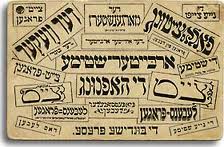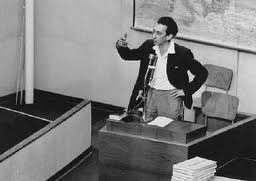 Meyer Joshua Nurenberger, an internationally-known Jewish writer and publisher who founded the Canadian Jewish News, has died in Toronto at the age of 90.
Meyer Joshua Nurenberger, an internationally-known Jewish writer and publisher who founded the Canadian Jewish News, has died in Toronto at the age of 90.
During a journalistic career that stretched from the 1930s into the 1990s, Mr. Nurenberger interviewed Albert Einstein, covered the Nuremberg and Eichmann trials, and was editor of the Morgen Journal, a prominent New York Yiddish paper. Fluent in 10 languages, he penned articles in Hebrew and French for publications in Israel and France, and wrote the main editorial column for the New York Yiddish weekly Algemeiner Journal until Alzheimer’s disease incapacitated him in the 1990s.
Born in Krakow in 1911, he arrived in the United States in 1938 and served as a captain and war correspondent for the U.S. Army during WWII. Stationed in Europe, he issued laise passé or travel documents that helped more than 100 Jews escape the Holocaust.
At the Nuremberg war-crimes trials, he was photographed prominently displaying a Yiddish newspaper before the prisoners in the dock. “It was his way of saying, ‘You tried, guys, but you didn’t succeed,'” said his friend, Toronto lawyer Louis Silver.
A strong supporter of the Canadian Conservatives and the Israeli political right, Mr. Nurenberger’s political associates included Menachem Begin, Yitzhak Rabin and former Prime Minister John Diefenbaker, whom he advised on Middle Eastern politics.
It was at Mr. Begin’s suggestion that Mr. Nurenberger brought his family from New York to Toronto in 1957 to edit a Yiddish newspaper. When its office burned down in 1959, he and his wife, Dorothy Cohn Nurenberger, decided to launch an English-language Jewish paper.
As they were preparing the first issue for publication, the couple received repeated death threats and a swastika was painted on their garage. Mr. Nuremberger was undeterred, even though, for a brief time, his eldest daughter had to walk to school under police escort.
The first issue of the Canadian Jewish News appeared in January, 1960; the Nurenbergers published it for more than a decade. For many, its survival was due as much to Dorothy’s popular columns about theatre and the arts as it was to Meyer’s strong political commentaries.
“He was the type who could disagree with someone politically, and fight with his pen for what he believed in, but on a personal note he could be his good friend,” Mrs. Beck said. “He could understand that somebody could have a different opinion.”
According to Toronto historian Irving Abella, Mr. Nurenberger was one of the first political commentators to blast the Canadian government for its indifference to the presence of Nazi war criminals here.
In 1971, a year after his wife died, Mr. Nurenberger sold the paper to a consortium of three private owners, who toned down the political rhetoric and turned it into much more of a communal organ, even arranging to send it for free to supporters of the United Jewish Appeal. Although they eventually succeeded in increasing circulation more than tenfold, Mr. Nurenberger’s heated differences with the new owners became legendary in journalistic circles.
“He believed that a newspaper should be a thorn in the side of the establishment,” Mrs. Beck said.
In 1975 he launched the Jewish Times, a small tabloid that he maintained until 1991. In 1985 he published The Scared and the Doomed, part memoir and part history, in which he argued that internal bickering prevented the American Jewish community from taking any serious concerted action against the Holocaust.
“He had a lot of friends and he had a lot of opponents in the Jewish community,” said Ben Kayfetz, a former official of the Canadian Jewish Congress. “He seemed to see himself as a fighter for the cause that was right — right in both senses of the word. While not everyone agreed with him politically, they respected him as a journalist.”
Author Lewis Levendel devoted a chapter to Nurenberger in his 1989 book, A Century of the Canadian Jewish Press: 1880s-1980s. The book characterized him as colourful, influential and fiercely independent.
He is survived by two daughters, Atara Beck and Ilana Ovadya. A third daughter, Cynthia Berke, died in 1997. ♦
© 2001







